Google is becoming a relevant player in the online hotels sector, something which makes the big existing players like Booking.com or TripAdvisor uncomfortable.
However, Google’s strategy is different to the one of its competitors. It’s not becoming an OTA per se (such as Booking.com or, as it appears, TripAdvisor) and neither is it creating a metasearch engine such as Trivago or Kayak.
Google Hotel Ads (GHA) is a platform of inventory and prices distributed over the different Google products: its search engine, its maps and the new Google Destinations. Is there any doubt now that we will see these prices on Gmail or Google Now sooner rather than later? On the other hand, strangely enough, the product that Google created as a pure price-comparison tool, known as Google Hotel Finder, was shut down in September 2015. That wasn’t Google’s war. Let’s see how Book on Google (Google’s next attempt to enter in the travel industry) work.
By the way, GHA is the new name of what was previously known as Hotel Price Ads (HPA), a name that has now been removed from its vocabulary.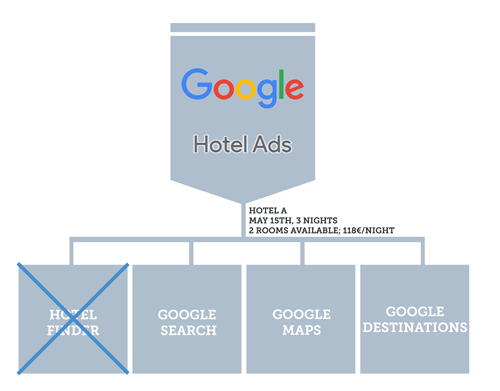
Using the search engine or the maps, the importance that Google is giving these prices in real time is evident, particularly on mobile devices where its prominence in proportion to the screen size is much higher. Google calls it micro-moments and it consists in giving users what they are looking for at the right time and naturally
Why participate in the Google Hotel Ads programme?
As a hotelier, it is key to be in GHA since you are occupying an essential display window such as Google and are directly competing with the OTAs in a field in which they have consolidated themselves in by diverting many sales to their pages. All of this takes us to our final objectives: reducing the cost of intermediation and gaining independence from it.
Remember that you are already participating in GHA through OTAs and you are financing their campaigns for them. In other words, OTAs do not invest a single cent in order to place your hotel in metasearch engines, you are paying for everything.
What models does Google offer to participate in GHA?
Within the GHA programme, Google offers the following three different forms of use:
- The traditional CPC (cost per click) model, where you pay an amount for each visit that goes to your website.
- A model that is a hybrid between CPC and CPA, which Google calls “ROAS target”, which is simply setting a “target commission” (for example, 10%) from which they optimise the CPC in order not to surpass the 10% commission when calculating the investment from the generated income.
- The new and pure CPA (cost per acquisition, aka commission in hotel talk) model, which Google calls Google Hotel Ads Commission Program (GHACP), which we wrote about a few weeks ago.
What are the differences between these three models?
CPC |
ROAS Target |
CPA |
||||
| Payment method | Cost per click | Cost per click | Cost per acquisition (commission) | |||
| How much does it cost? | It depends on how aggressive you want to be. It works similarly to Adwords: you set a CPC maximum and Google chooses the winning option via an auction. The more bidders there are, the higher is the cost. | The % of commission that you want, taking into account that Google will calculate an equivalent CPC for the auction. If the % is low, your bids will not appear. | Whichever commission you want, always between 10% and 15%. | |||
| Does it take cancellations into account? | No. All clicks cost the same, regardless of whether they generate a booking or not. | No. The equivalent commission is set prior to the cancellations (be careful with being aggressive since cancellations are absorbed by you). | Yes. Since it’s a system based purely on commission, you only pay for the bookings you have charged for. | |||
| Which model offers more visibility for my hotel in the search results? | You can get the same visibility for your hotel regardless of the model you choose. The more you bid (in CPC or commission) and the better the offered price is, the more chances you will have of appearing in the top places. | |||||
| Can I set an investment limit? | Yes, both daily and monthly (e.g. 800€/month) | Yes, albeit indirectly. By setting an equivalent commission you will ensure the profitability of the investment. | Being a commissionable model, why set an investment limit? The more sales, the better. | |||
| Can I hire this service directly from Google? | No, you need an integrated partner with theCPC model. You can find a list of them here | No, you need a partner integrated with the CPA model. Not all GHA-integrated partners support the CPA model. Ask your provider. | ||||
| When do I have to pay? | When the click is made, before the client arrives. Therefore, you pay in advance, just like with Adwords. | Monthly, after the client’s stay. | ||||
Which is the best model for your hotel?
Since you can receive the same income results with all three models, you must choose the options that incurs the lowest cost.
Conceptually, hotels with higher average price and higher average stay are candidates for the CPC model, since they will have an equivalent commission lower than 10%. Our recommendation is to start with this model.
For the remainder, the recommended option is the pure CPA model, since it minimises risk, minimises the budget management and optimisation and, on top of it all, it generates a positive cash flow (you pay when the client has paid). At Mirai, we are transferring almost all of our clients to this model.
Having a pure CPA system, we do not see any reason to hire the “CPC ROAS target” model.
What should your strategy be in Google Hotel Ads?
Participating in GHA is only the first step, but it’s not enough. To be there for the sake of it, in other words, participate without generating bookings, is not the objective. You have to have a strategy behind it, a strategy that allows you to generate a high number of bookings and save money from the commissions paid out to OTAs. At Mirai, we believe that the following strategy is the right one:
1. Choose the GHA model which offers you maximum profitability while maintaining an adequate number of bookings. If you have any doubts, CPA is the model for you.
2. Remove all intermediation from GHA. An essential objective for hotels and hotel chains but that is rarely seriously posed. What value does Booking.com give you in this search? If you can be there directly in metasearch engines, intermediation offers no value. Sadly, this is a difficult battle in today’s day and age due to the refusal from OTAs.
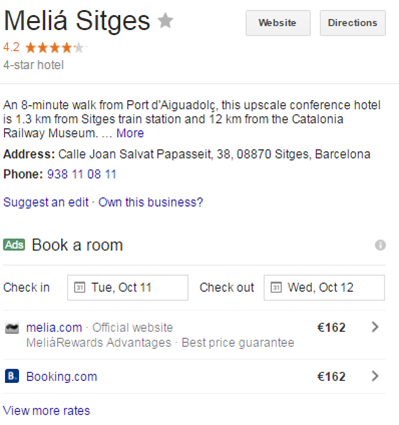
3. Remove the disparities from OTAs who are fishing for these prices via bed banks or another OTA by taking advantage of the many holes that hotel distribution has. Being present in GHA to see the result of the image below is pointless.
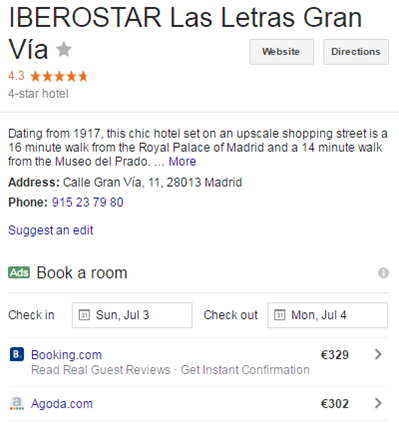
4. Maximise your visibility
Once you have done your initial homework, you must understand how GHA shows the results and how it sorts them. By default, it shows two entries in its results. The ranking is determined by two main factors: the bid (how much Google earns for having you up high) and the quality where price competitiveness and conversion come into play.
Booking.com brings the same strategy to GHA as it has on Adwords: occupying the first position at any cost. Fighting for the first position will be very expensive. Since you cannot remove Booking.com from GHA (because they will refuse and because, I fear, you are contractually obliged not to), play to occupy the second position like we explain below.
If you maintain a price-parity policy, it’s probable that, as well as Booking.com, any other OTA may improve your bid and your entry ends up buried in the “See more prices” link. This is not the correct strategy.
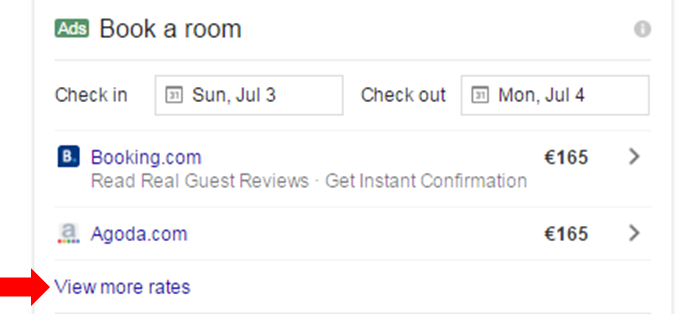
Your most profitable option, and the one that will generate more bookings for you, is the one that offers the best price on your website. This will all but guarantee second position, something which will maximise your entry’s visibility and will show the client the advantages of booking directly with you (which will also save costs). This is the strategy that all large hotel chains and advanced hotels are following, an unstoppable trend which many independent hotels and hotel chains are joining.
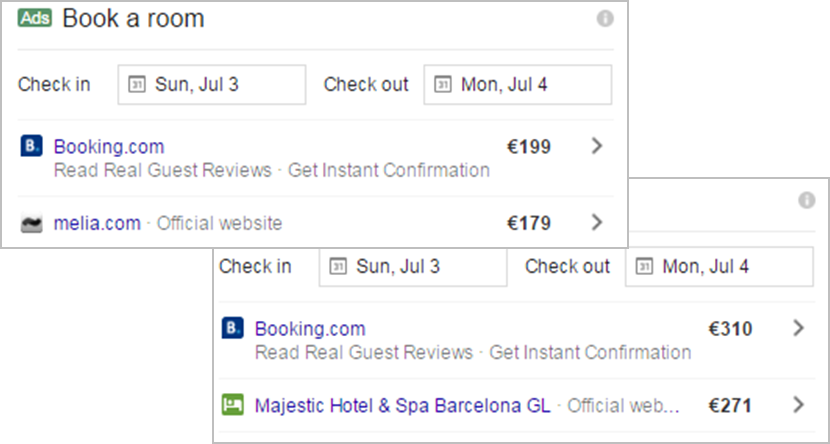
Conclusion
Google has slowly been entering the travel sector, especially the hotel one. It’s here to stay, whether we like it or not. On one hand, it’s another toll to pay but, on the other, it’s a great chance for hotels who wish to reduce the large dependency they have on OTAs. Finally, a powerful weapon with no risk.
However, remember that technology is just part of what you need. The key is in the knowledge and skills of being up to date and making the most of the opportunities that come along. GHA, undoubtedly, does much more good than bad, although it confirms once more that direct sales aren’t cheap -much to the delight of OTAs. However, they are still cheaper than intermediated sales, no matter what some OTAs say.



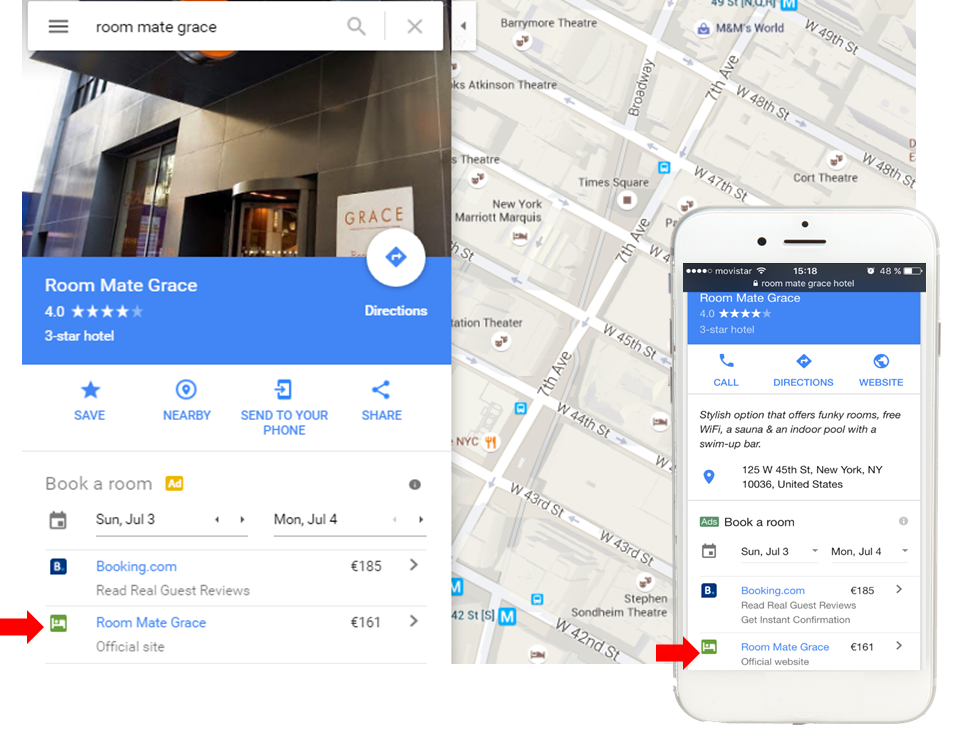

Va a ser díficil desbancar a OTAS como Booking porque la gente y los hoteles pequeños y medianos buscan usabilidad y confianza. El ser humano es un animal de costumbres.
Por la misma razón que Hotel Finder desapareció, esta iniciativa parece abocada al mismo camino. El éxito de booking es que es el buscador de hoteles de cabecera, y a Google en este sentido, como mucho le queda absorber a booking si quiere entrar en este mercado.
Ya se sabe que el que entra primero…
Saludos
Hola Pablo, totalmente de acuerdo con tu planteamiento, Google ha empezado a abrirse camino, aunque tiene mucho que aprender de las OTAS y del sector, es cierto que ha sido bien recibido por los hoteles y los consumidores que tienen otra opción en el mercado.
It should also be noted that Google pays attention to room rates as a ranking factor; if it thinks you’re charging more than the other booking platforms, it may place you lower in search results.